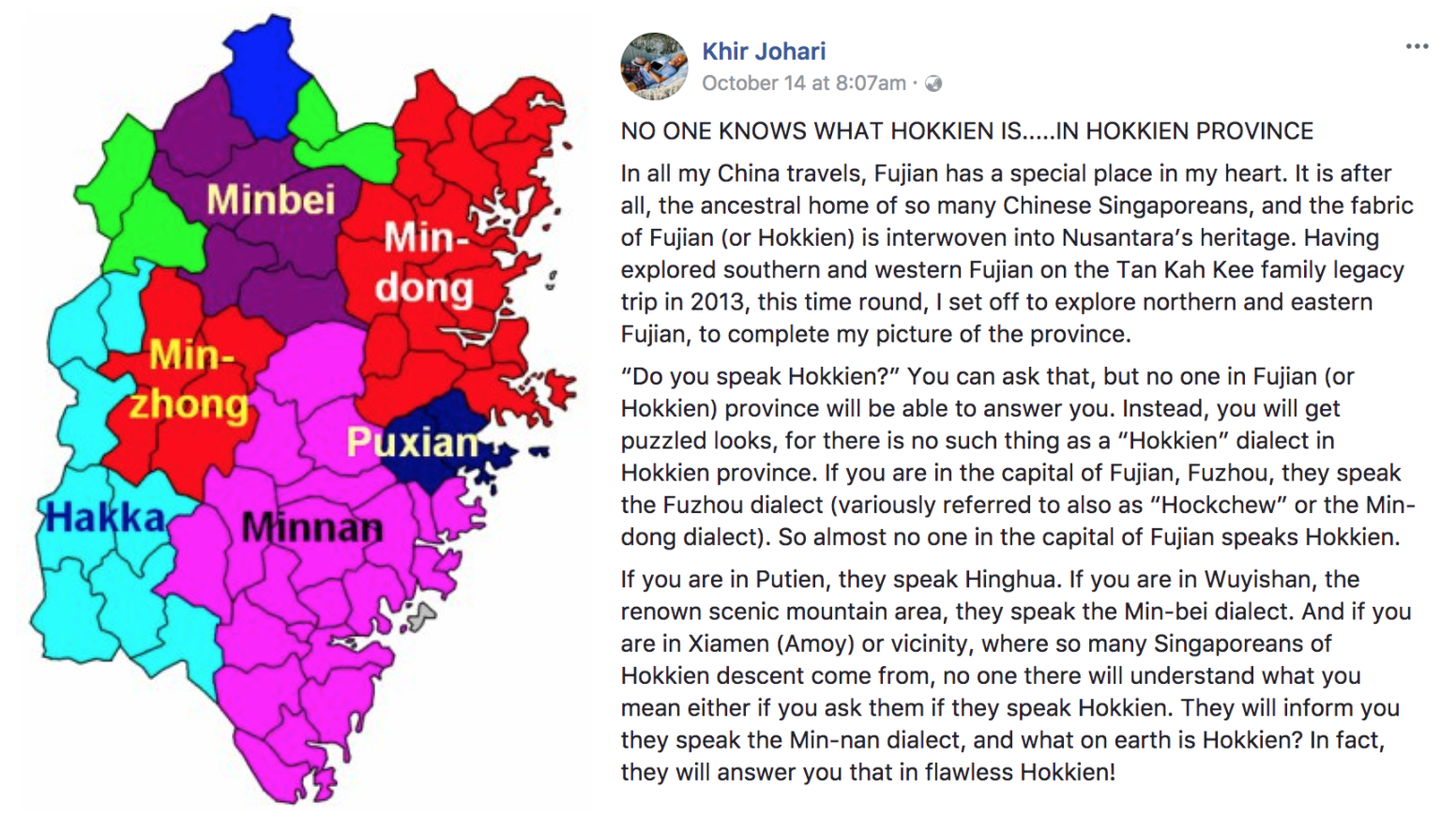"Hokkien" is a word we take for granted in Singapore as a term that encompasses culture, place, and especially language.
If you use Wikipedia a lot, well, it says so too:
 Screenshot via Google search
Screenshot via Google search
Enter the Vice President of The Singapore Heritage Society Khir Johari, who discovered that there's no such thing as "Hokkien" as a language after his travels in Fujian Province, China.
In his Facebook post dated Oct. 14 that has since been shared more than 300 times, he masterfully dissected the intricate cultural and geographical aspects of local dialects in the Chinese province that is the ancestral home of many Chinese Singaporeans, revealing much insights and useful information for many that did not know.
His 867-word post - "NO ONE KNOWS WHAT HOKKIEN IS.....IN HOKKIEN PROVINCE" is well worth reading in full, but for those who are short on time, here's a rundown of the interesting points:
1. No such thing as a “Hokkien” dialect in Hokkien (Fujian) province.
Khir who has been to different parts of Fujian made it clear that there is no such thing as a "Hokkien" dialect, and any questions posed to locals about it, will only get you puzzled looks.
If you are in the capital of Fujian, Fuzhou, they speak the Fuzhou dialect (variously referred to also as 'Hockchew' or the Min-dong dialect). So almost no one in the capital of Fujian speaks Hokkien.
If you are in Putien, they speak Hinghua. If you are in Wuyishan, the renown scenic mountain area, they speak the Min-bei dialect. And if you are in Xiamen (Amoy) or vicinity, where so many Singaporeans of Hokkien descent come from, no one there will understand what you mean either if you ask them if they speak Hokkien. They will inform you they speak the Min-nan dialect, and what on earth is Hokkien? In fact, they will answer you that in flawless Hokkien!"
[related_story]
2. The Min group of dialects
He then directed readers' attention to the meaning of the Chinese character 'Min' (闽) that was repeatedly used in the references to the dialects spoken by the locals in Fujian.
According to him, "Min" is the defining term in Fujian's geography and history. It is the name of the river that bisects the province, separating its western and southern half, from its northern and eastern half. The river also acts as the compass of Fujian’s linguistic geography.
"To the north of the Min River, one speaks Min-bei hua, or the dialect north of the river Min. Along the eastern reaches of the river, such as at the Fujian capital, Fuzhou, one speaks Min-dong hua, or the dialect to the East of the river Min. South of the river Min, one speaks Min-nan hua, or the dialect to the south of the River Min.
Interestingly, in most of the lands of Min-xi (West of the River Min), one does not speak a dialect that is a member of the Min group of dialects. Rather the lingo of Min-xi is a separate Chinese dialect group, Hakka.
In an early court document, Fujian is referred to as the 'Land of the seven Mins'."
[related_story]
He also explained that there are other dialects that are part of the Min group of dialects but spoken outside Fujian. Some of these dialects are ones that we are familiar in Singapore, such as Teochew and Hainanese.
"Just as not all dialects in Fujian are part of the Min group of dialects, so the Min dialects themselves have spread beyond Fujian. Thus, Teochew in Guangdong province is a Min dialect, and so is Hainanese. In fact, not only are these Min dialects, they are actually Min-nan sub dialects i.e. Teochew and Hainanese are derivatives of 'Hokkien' (although some Teochews I know won't be too pleased to hear this! ?). So in many ways, 'Hokkien' is closer to Hainanese, two provinces away, than it is to the Fuzhou dialect, 3 hours distant by road."
3. Simplicity from a Malayan perspective
Eventually, he came to the crux of why most of us use the word "Hokkien" to describe a dialect in Singapore, and why most of us in this part of the region have done so in general:
"So whither Hokkien? Well, since most of the people who came to Malaya from Fujian/Hokkien province came from the Min-nan lands of Xiamen, Quanzhou and Zhangzhou, their language for simplicity was called Hokkien.
The minority who came from other part of Fujian are referred to by their specific local dialects in Malaya. Thus, isn't it ironical that the people who live in the capital of Hokkien don't speak 'Hokkien'? And it is the folks in the southern reaches of the province who speak a dialect whose name suggests the entire province?
This type of naming is actually not unique to 'Hokkien' in Malaya. Thus, we call the dialect spoken in the western half of Guangdong province 'Cantonese', or the Guangdong language. But Guangdong itself has three distinct dialect groups. There is the Guangzhou dialect in the west ('Cantonese'), the Hakka dialect in the Northeast, and the Teochew dialect in the southwest. But from the Malayan perspective, the dialect of the western half of the province speaks for the entire province.
[related_story]
His conclusion:
"So please don't ask anyone whether they speak Hokkien when you are in Xiamen. Ask if they speak Min-nan dialect. And in Taiwan, ask if they speak 'Taiwanese'!"
That pretty much sums up the heritage researcher's interesting and informative crash course on "Hokkien" for those who never knew about what it really means.
You can read Khir's Facebook post on the concept of "Hokkien" in full below:
Top image composite image via Khir Johari's FB and Wikipedia
If you like what you read, follow us on Facebook, Instagram, Twitter and Telegram to get the latest updates.
